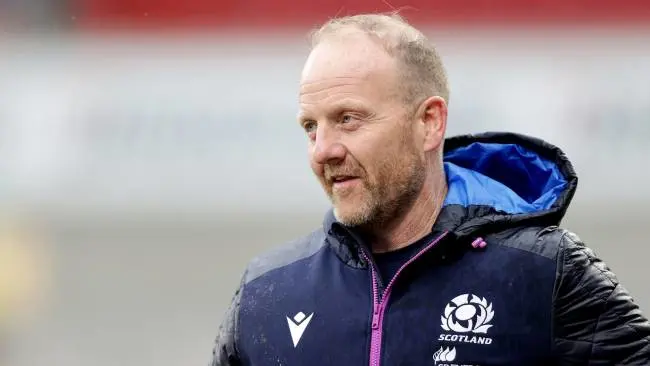Bryan Easson’s journey to Scotland head coach has been far from straightforward but he would not change a thing.
He joined the women’s set up in 2020, initially as an interim head coach, before taking on the job permanently after just one match.
Since then, he has led them to the 2021 World Cup the long way round, eventually qualifying in a repechage tournament to end a 12-year drought and make the trip to New Zealand.
That is just the latest chapter in a rugby journey that has had many ups and downs, with Easson beginning his coaching career far earlier than planned after being forced to retire at the age of just 25.
Easson, now 49, said: “I was pretty much born with the ball in my hand. I’ve been involved in rugby ever since I can remember, me and my cousins played for our local rugby club.
“I was quite young into senior rugby, which I was playing from the age of 16, and I signed a professional contract with Caledonia Reds, which was one of the first professional rugby teams in 1996 or 1997, just as professionalism came in, and then went down to Exeter Chiefs.
“Rugby was always with me but I had two back surgeries when I was at Exeter – in fact, I had back surgery and testicular cancer all at the same time.
“I had to retire from playing at 25, basically because of my back, which meant I got into coaching early.
“In hindsight, that has probably got me to where I am at the moment.
“It sounds a bit like a pilgrimage, but I went from Exeter to Inverness. My first job was a development officer in Inverness, I only lasted up there for 18 months because I got a job as performance manager in the Borders.
“That’s where I started my journey in coaching, then I got involved in Scotland U16s, U17s U18s and did three World Cups for Scotland Under 20s, before I worked with Edinburgh Rugby, with the academy and then ultimately with Scotland Women.
“It has been a long journey but it has been a really good learning curve for me.”
A long journey means Easson has influenced a lot of important figures in Scottish rugby over the years, not least Stuart Hogg, one of Scotland men’s greatest ever players, who is set to earn his 100th cap in the Guinness Six Nations this weekend.
Easson added: “For somebody who you have worked with from a young age and who has now become a good friend, to see them get their 100th cap is exciting.
“You are only a very small part of their journey but just even being a small little part in anybody’s journey, whether that is Stuart Hogg, Rachel Malcom, Helen Nelson, it is really important that you are there for them.”
The former fly-half adapted from being a coach to marking his path as Scotland head coach quickly, a role in which has enjoyment has continued to grow, with professional contracts handed out in December 2022.
“They deserve that reward,” he said.
“The two years prior to the World Cup were probably the toughest years for them as a group because of Covid and it was accident rather than design.
“We had to do as much stuff as we could and it was really difficult for the players to be working from home and then come in and train, which was lucky in itself as we had elite athlete exemption at the time.
“It is not until when you are with them at 7/8/9pm when you realise, they started working at 7am to then go back to a job and what they put in.
“Whereas now, I travel down regularly to see them, and it is so good to see them get to actually rest and recover and sleep and eat properly.
“The training is probably not that different from how it was before, but they then don’t have to go to a job so there is professionalism to recover properly and be able to feel fresh going into a session.
“It will take time – there is a misconception that as soon as you turn professional, performances are going to change immediately.
“Performances will change, and they will improve, but it will take time for everything else to improve and be consistent.”



